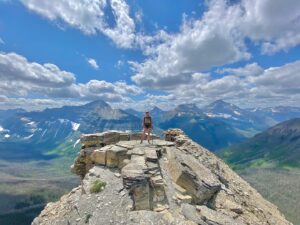by myself for 11 hours and over the 18 miles I traversed a winding path, along a lake, through forests, along contours that crisscrossed the mountains, up steep treacherous scree, to ridge line precipices, I climbed close to 6000 feet to a total height of 11,000 at the highest peak.
And through all that time I thought. I thought of The Blackfeet Nation and how much I learned in my few short days on their reservation.
I listened as a Blackfeet family spoke about their names, and how they have a colonizer name but then they also have their indigenous Blackfeet names and members of their tribe will likely have two or three names during their whole lives. They have their Blackfeet childhood name, then women have their adult name, and men often times have another names depending on what title they hold in the tribe, like hunter or warrior.
And I love that, I love the honoring of the person as a child and then to also have a name that encompasses the person that child grew into.
I climbed a mountain pass in Montana and walked along a trail the Blackfeet Indians created a long time ago.
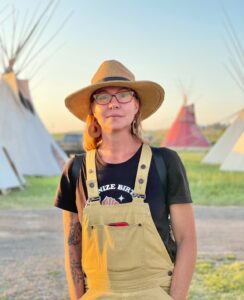 And I felt the generational trauma when we stopped on their reservation, boarded up buildings, shacks with tarps over the roofs, and yet I saw and felt the spirit of the people.
And I felt the generational trauma when we stopped on their reservation, boarded up buildings, shacks with tarps over the roofs, and yet I saw and felt the spirit of the people.
I sat and listened as Blackfeet tribal members and elders both spoke and signed in their native language. A language that is rich, descriptive, and circular in nature whereas the colonizer tongue is flat and linear with no depth.
The language I speak cannot encompass the details, respect, and spirituality that moves in the Blackfeet hands and tongues. Where we say “tree”, they say “growing up from the ground”.
I listened as they shared how they fought the Hudson Trading Company for 100 years to keep them from killing the most sacred animal to the Blackfeet, the Beaver. And when smallpox decimated two thirds of their tribe, they could fight them off no more. White man came and decimated the beaver population and actually changed their circadian rhythms from diurnal animals into nocturnal ones.
Bordering the reservation, I drove by obelisks and statues celebrating the white man in finding a pass for the railroad to bring those beaver pelts back to New York City.
I climbed mountains that were named after Blackfeet princesses and war chiefs. I listened as they said that if you joined a tribe through marriage, you became part of that tribe. No matter what your blood was.
And I learned that they are held to strict blood laws like the 1/4 blood quantum law where one has to be one-fourth Native American blood to be recognized as Native American. “We are the highest regulated race in the world,” but as one mother shared “In our culture it has nothing to do with blood, if I wanted you (white person) in my family, I would take you in and you would be a Blackfoot because I said so.”
Theirs is a matriarchy, led by the woman, but supported and in balance with the male. Women were and are revered, seen as the furthering of their civilization and the bearers of life. They sit at the head at ceremony.
And they spoke about their names, and how they have a colonizer name but then they also have their indigenous Blackfeet names and they will likely have two or three names during their whole lives. They have their childhood name, then women have their adult name, and men often times have three names depending on what title they hold in the tribe, like hunter or warrior.
And I love that, I love the honoring as children and then to also have a name that encompasses the person that child grew into.
And I connected with the Piikani Lodge Health Institute, an indigenous led non profit and learned about their activism that encompassed the intersections of food sovereignty, relationship to land, and effective culturally relevant and trauma informed care while ensuring that Traditional Knowledge Models remain central to health and well-being.
I asked how do members of the Blackfeet Nation give birth? And I learned that the Blackfeet Indian Health Service Hospital has received designation as a Baby-Friendly hospital and has increasing breastfeeding rates. Although there are many native/indigenous doulas offering support across the United States, there are none currently in the Blackfeet nation. But they spoke of wanting more support and of a want to collaborate and branch out their services here.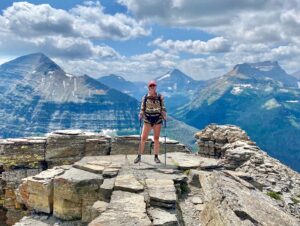
And as I foraged across sacred pathways of spring glacier creeks, I paused at a crossing where two cascading creeks came together and I remembered that even in duality, everything still moves into one. And it is where these two streams merge, the alchemical mixing ,where the magic happens.
As I hiked that long day, with the sun at my back, on my left, and shining down in front of me, I set my internal compass to the directions. And as I made connections to members of the Blackfeet Nation I made an internal promise to continue to build relationships and come back with an offering of whatever training resources I have to support their community driven movements.
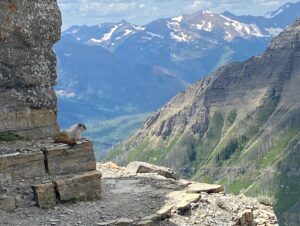 And across the pass, I met a marmot on the hillside. They paused to look at me and I them. And as we stared I asked “Is there anything you need me to know?”
And across the pass, I met a marmot on the hillside. They paused to look at me and I them. And as we stared I asked “Is there anything you need me to know?”
And in that moment, they looked at me, stood up on their hind legs, put their front paws together, and bowed. Then they got down on all fours and scampered away.
As if to say “You are holy, thank you for being here.”
And as I settled into the protection and shadows of the north facing side of the mountain, I found myself asking the age old question from Mary Oliver: “And what will you do with this one precious life?”
This I think will be the forever question for all of us. But that day, on a Montana mountain pass, I lost my breath at the sheer beauty around me. And at the edge of the Blackfeet Nation, I cried hot tears of grief for the genocide and ethnic cleansing of their people.
That day, I found a little bit more of myself in the wind. And I also found a more clear view on how precious both our creation stories, and our lives truly are.
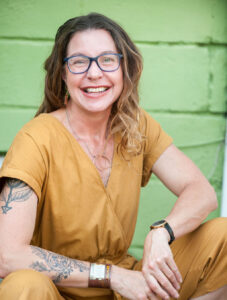 Chama Woydak is a fun-loving mother of two who has been attending births as a birth doula in Asheville since 1999 and teaching childbirth education classes since 2002. Chama is a full spectrum birth, death and postpartum and abortion doula, a Lamaze childbirth educator, a DONA International Birth Doula trainer, a Holding Space for Pregnancy Loss Instructor and the Strategic Doula Advisor for Sistas Caring 4 Sistas, a community-based doula program located at MAHEC She is also the owner of Homegrown Families a perinatal health center and doula agency located in Asheville, NC.
Chama Woydak is a fun-loving mother of two who has been attending births as a birth doula in Asheville since 1999 and teaching childbirth education classes since 2002. Chama is a full spectrum birth, death and postpartum and abortion doula, a Lamaze childbirth educator, a DONA International Birth Doula trainer, a Holding Space for Pregnancy Loss Instructor and the Strategic Doula Advisor for Sistas Caring 4 Sistas, a community-based doula program located at MAHEC She is also the owner of Homegrown Families a perinatal health center and doula agency located in Asheville, NC.

